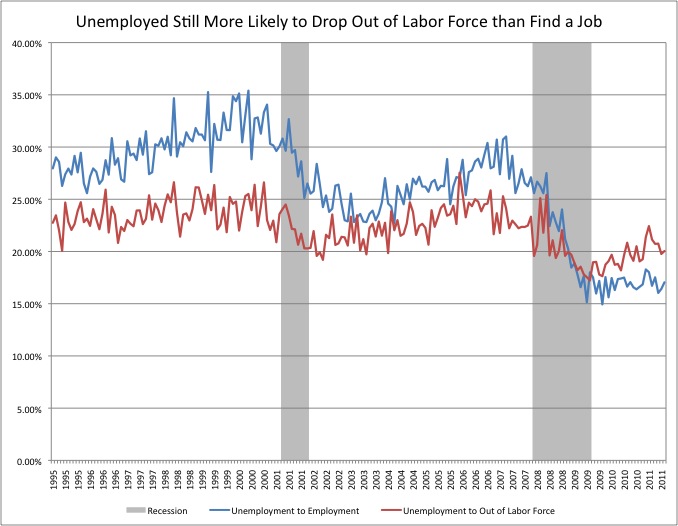14.09.2011
Policy Points
A recent hour-long documentary prepared by American RadioWorks, a component of American Public Radio, looked at the problem of degree completion at America’s institutions of higher learning.
According to the program, some 37 million Americans have completed some college yet left school prior to finishing a degree. Typically, people leave college due to practical obstacles like the need to work, but at the same time, many of these obstacles can be minimized through smart public policies.
Click here to listen to the documentary, Some College, No Degree, or click here to read the transcript.
13.09.2011
Policy Points
Economic policy reports, blog postings, and media stories of interest:
13.09.2011
Policy Points
Over at Rortybomb, Mike Konczal points out that unemployed Americans are more likely to drop out of the labor force altogether than they are to find a new job. The graph below shows that trend by illustrating the flow of people classified as unemployed into the categories of employed and out of the labor force over the period spanning 1995 to the present.

13.09.2011
Policy Points
In a recent Policy Brief, The Working Poor Families Project presented ideas for improving state policies and practices pertaining to apprenticeship programs. From the report …
Apprenticeship holds the promise of providing good jobs and a path to self-sufficiency. however, unless states take bold actions to expand apprenticeship opportunities and strengthen entry and completion, low-skilled, low-wage adults may be left behind.
…
Several states have enacted programmatic and policy innovations to encourage employer development of apprenticeships, increase recruitment, preparation, and completion rates of under-represented individuals, and build apprentices’ pathways to postsecondary and industry-recognized credentials. along the way,states have formed closer ties between the registered apprenticeship system and community college, workforce development, and pre-apprenticeship programs. states have leveraged numerous funding sources to aid in apprenticeship expansion and services, including WIA, OJT, general revenue, federal construction funds, bonds, and the Unemployment Insurance Trust Fund, as well as enactment of tax breaks.
…
With state budgets running thin for education, workforce development, it is imperative that states find innovative, sustainable ways to support apprenticeship. Based on the experience of many states, this report recommends a variety of budget neutral strategies, as well as some that require financial investment.
12.09.2011
Policy Points
Economic policy reports, blog postings, and media stories of interest:


 Email Sign-Up
Email Sign-Up RSS Feed
RSS Feed